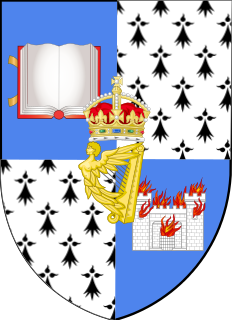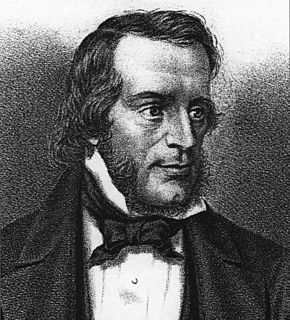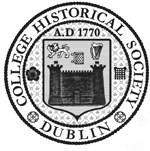Related Research Articles

Trinity College, officially the College of the Holy and Undivided Trinity of Queen Elizabeth near Dublin, is the sole constituent college of the University of Dublin, a research university located in Dublin, Ireland. The college was founded in 1592 by Queen Elizabeth I as "the mother of a university" that was modelled after the collegiate universities of Oxford and Cambridge, but unlike these affiliated institutions, only one college was ever established; as such, the designations "Trinity College" and "University of Dublin" are usually synonymous for practical purposes. The college is legally incorporated by "the Provost, Fellows, Foundation Scholars and other members of the Board," as outlined by its founding charter. It is one of the seven ancient universities of Britain and Ireland, as well as Ireland's oldest surviving university.

The University of Dublin, corporately designated the Chancellor, Doctors and Masters of the University of Dublin, is a university located in Dublin, Ireland. It is the degree-awarding body for Trinity College Dublin. It was founded in 1592 when Queen Elizabeth I issued a charter for Trinity College as "the mother of a university", thereby making it Ireland's oldest operating university. It was modelled after the collegiate universities of Oxford and of Cambridge, but unlike these other ancient universities, only one college was established; as such, the designations "Trinity College" and "University of Dublin" are usually synonymous for practical purposes.

College Green is a three-sided plaza in the centre of Dublin, Ireland. On its northern side is the Bank of Ireland building, which until 1800 was Ireland's Parliament House. To its east stands Trinity College Dublin. To its south stands a series of 19th-century buildings that are mostly banks.

The Book of Mulling or less commonly, Book of Moling, is an Irish pocket Gospel Book from the late 8th century. The text collection includes the four Gospels, a liturgical service which includes the "Apostles' Creed", and in the colophon, a supposed plan of St. Moling's monastery enclosed by two concentric circles.

Thomas Osborne Davis was an Irish writer; with Charles Gavan Duffy and John Blake Dillon, a founding editor of The Nation, the weekly organ of what came to be known as the Young Ireland movement. While embracing the common cause of a representative, national government for Ireland, Davis took issue with the nationalist leader Daniel O'Connell by arguing for the common ("mixed") education of Catholics and Protestants and by advocating for Irish as the national language.
Events in the year 1972 in Ireland.
Events in the year 1968 in Ireland.
Events in the year 1906 in Ireland.

The College Historical Society (CHS) – popularly referred to as The Hist – is one of the two debating societies at Trinity College Dublin. It was established within the college in 1770 and was inspired by the club formed by the philosopher Edmund Burke during his own time in Trinity in 1747. It is the oldest surviving undergraduate student society in the world.
In the universities of Oxford, Cambridge, and Dublin, Bachelors of Arts of these universities are promoted to the degree of Master of Arts or Master in Arts (MA) on application after six or seven years' seniority as members of the university. As such, it is an academic rank, and not a postgraduate qualification. No further examination or study is required for this promotion.
Galway Borough was a United Kingdom Parliament constituency, in Ireland. It returned one MP 1801–1832, two MPs 1832–1885 and one thereafter. It was an original constituency represented in Parliament when the Union of Great Britain and Ireland took effect on 1 January 1801.
University of Dublin is a university constituency in Ireland, which currently elects three senators to Seanad Éireann. Its electorate comprises the undergraduate scholars and graduates of the University of Dublin, whose sole constituent college is Trinity College Dublin, so it is often also referred to as the Trinity College constituency. Between 1613 and 1937 it elected MPs or TDs to a series of representative legislative bodies.
Michael Butler Yeats was an Irish barrister and Fianna Fáil politician. He served two periods as a member of Seanad Éireann.
"Steamboat ladies" was a nickname given to a number of female students at the women's colleges of the universities of Oxford and Cambridge who were awarded ad eundem University of Dublin degrees at Trinity College Dublin, between 1904 and 1907, at a time when their own universities refused to confer degrees upon women. The name comes from the means of transport commonly used by these women to travel to Dublin for this purpose.
Meath was a constituency represented in the Irish House of Commons until 1800.
Athenry was a constituency represented in the Irish House of Commons to 1800.
The High Sheriff of Galway Town was the Sovereign's judicial representative in the county of the Town of Galway. Initially an office for lifetime, assigned by the Sovereign, the High Sheriff became annually appointed from the Provisions of Oxford in 1258. Besides his judicial importance, he had ceremonial and administrative functions and executed High Court Writs.
Theophilus Blakely was an Irish Anglican priest.
Isidore John Blake was an Irish-born Australian politician and judge.
Andrew Henry Lynch was an Irish barrister and a Repeal Association MP.
References
- ↑ "Alumni Dublinenses: a register of the students, graduates, professors and provosts of Trinity College in the University of Dublin (1593–1860). George Dames Burtchaell / Thomas Ulick Sadleir p. 72: Dublin, Alex Thom and Co, 1935